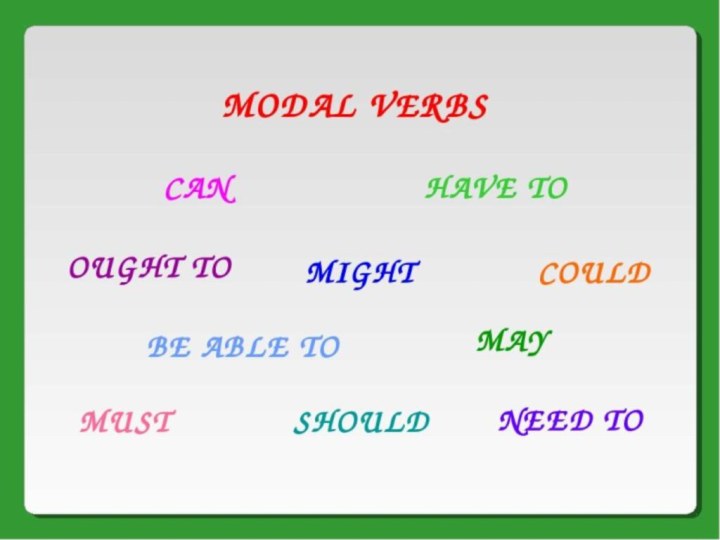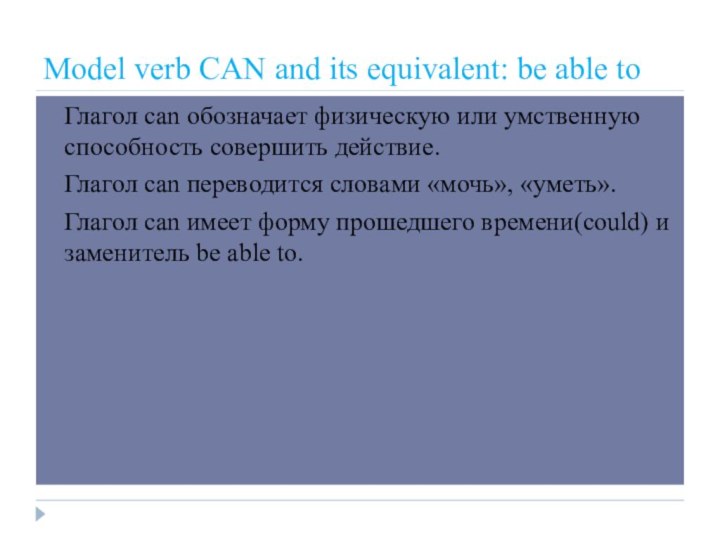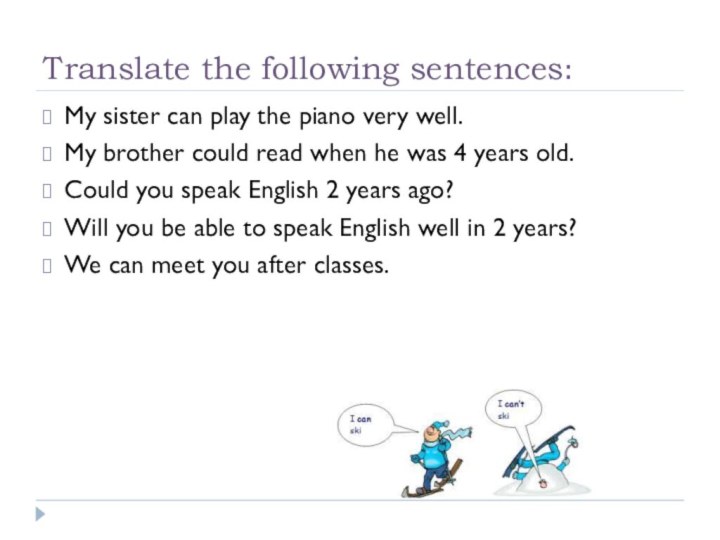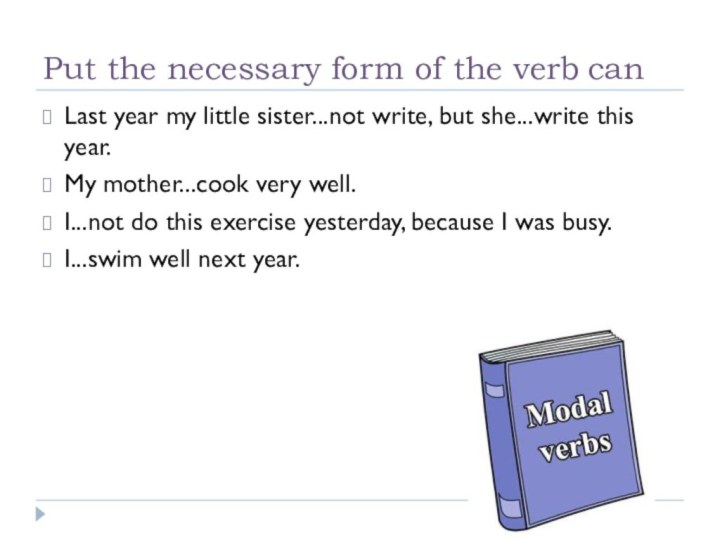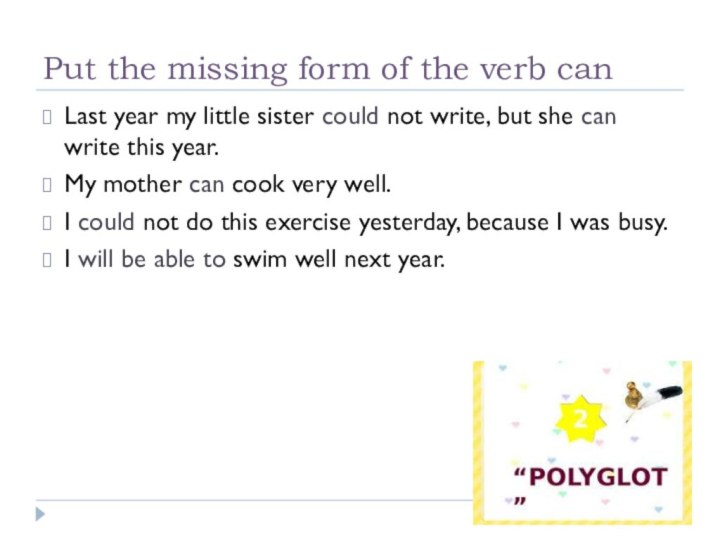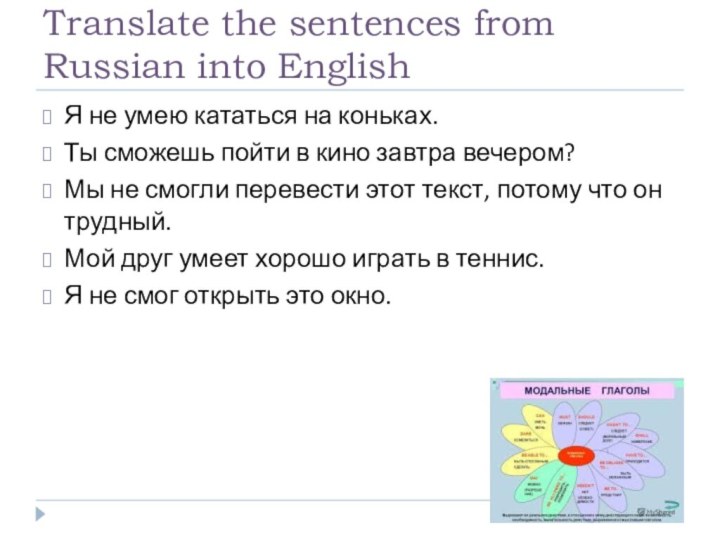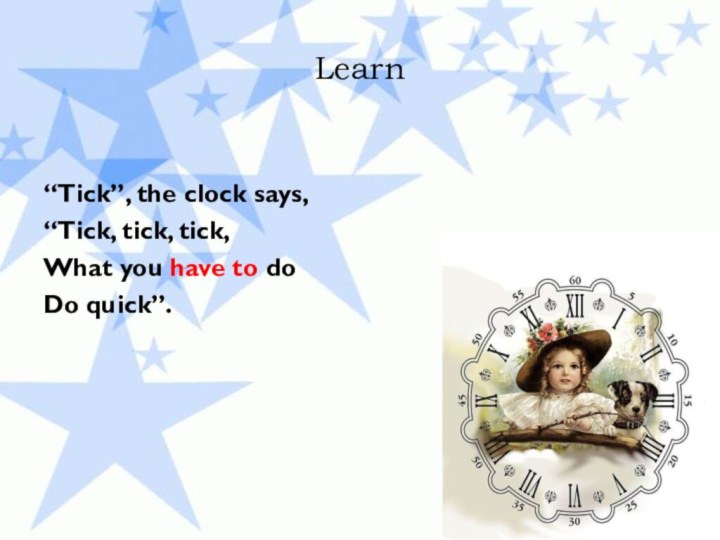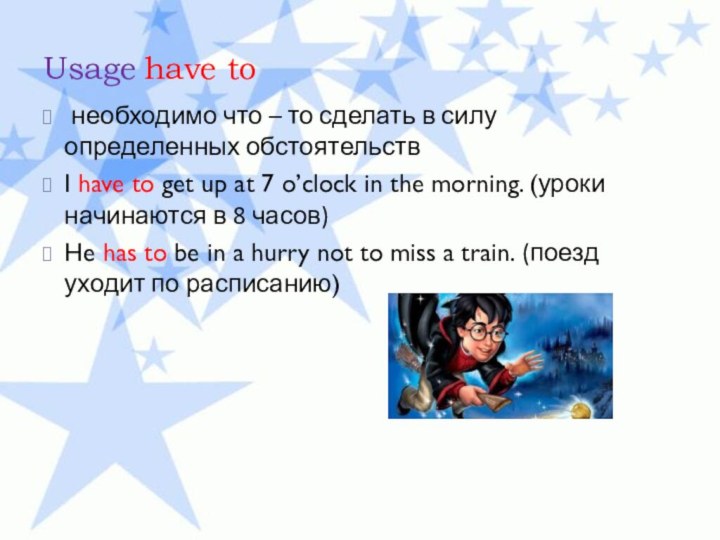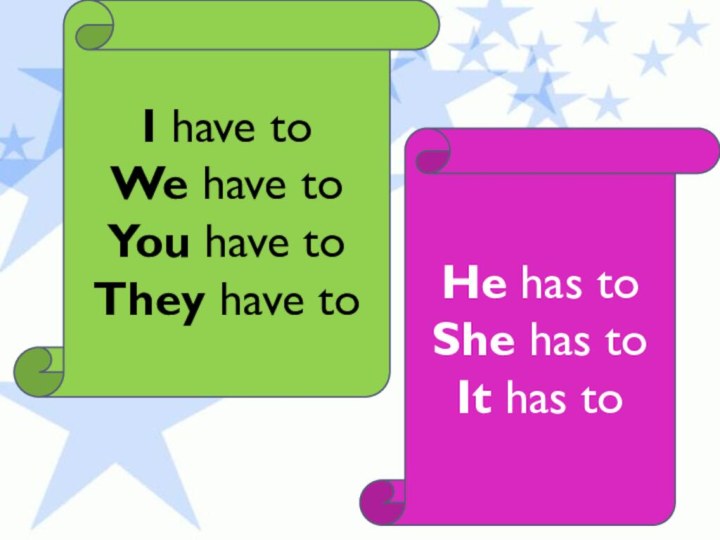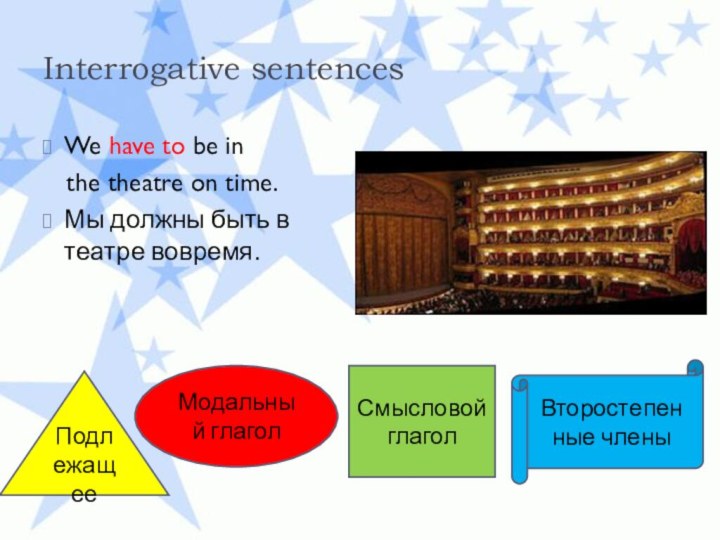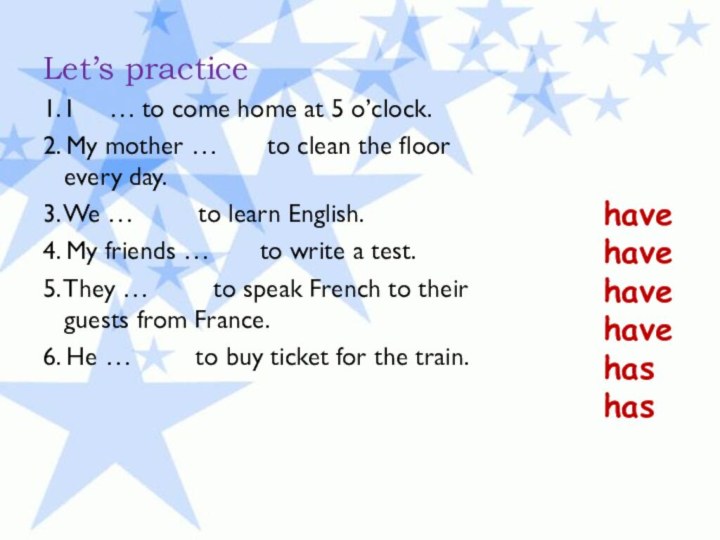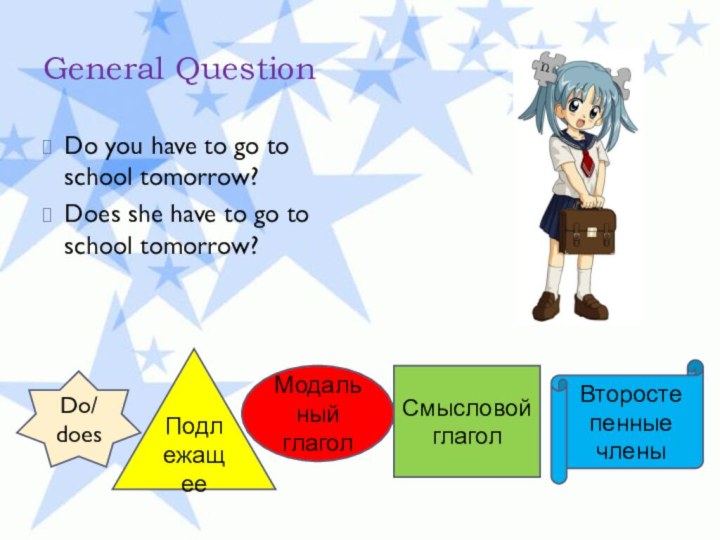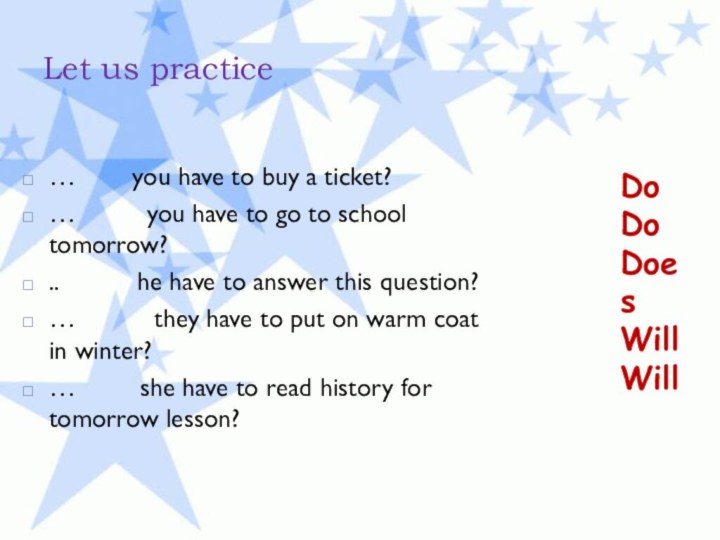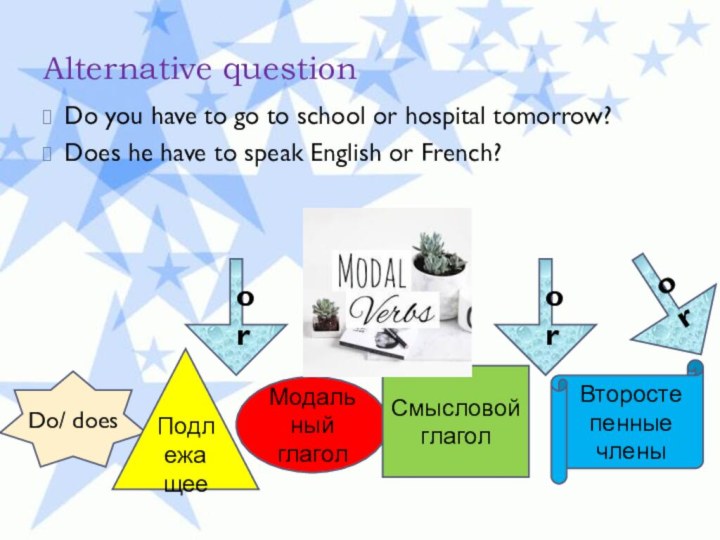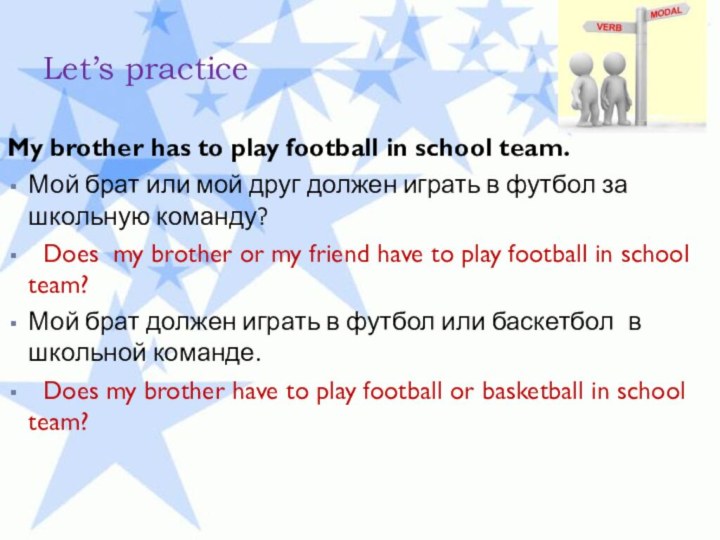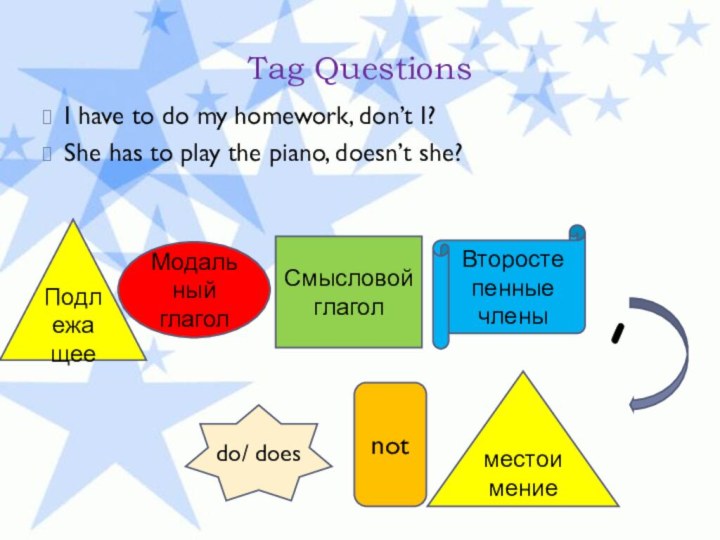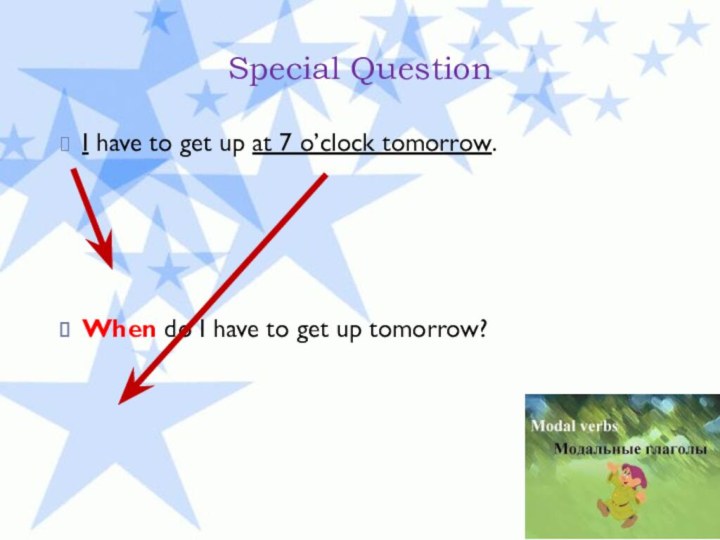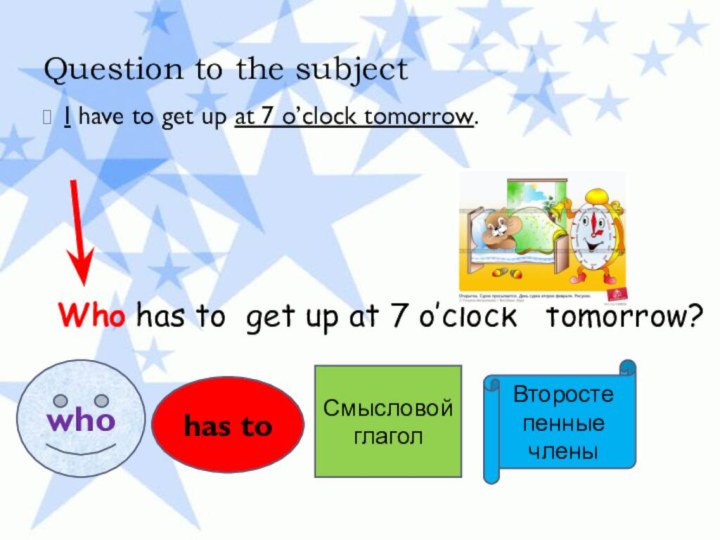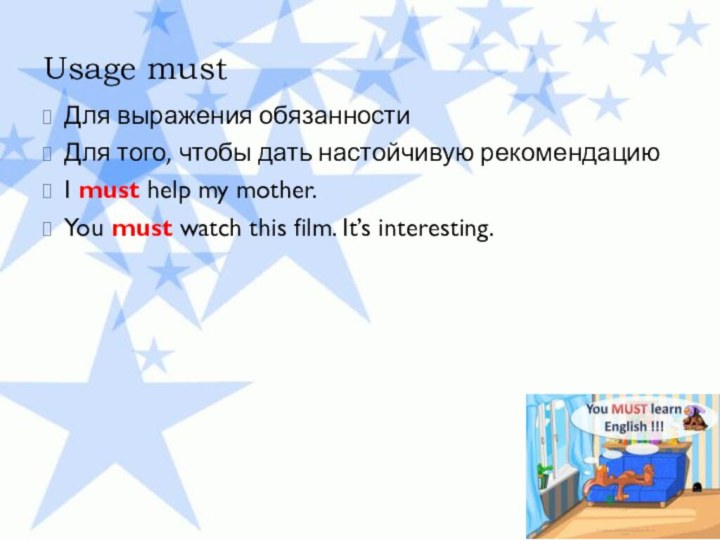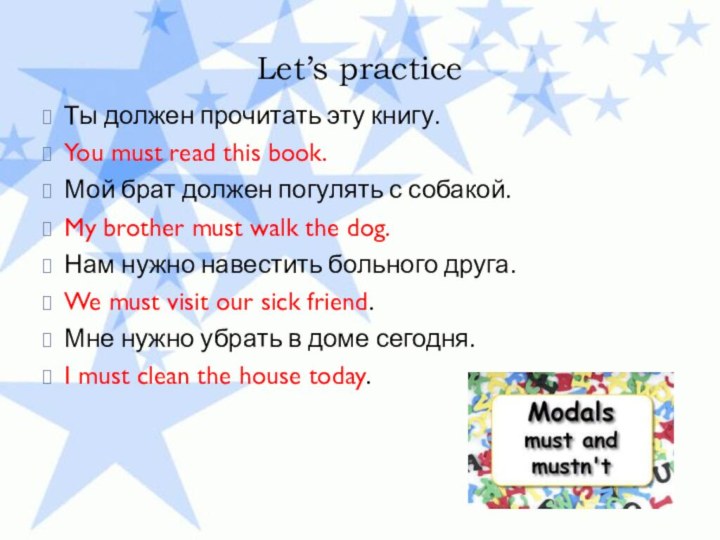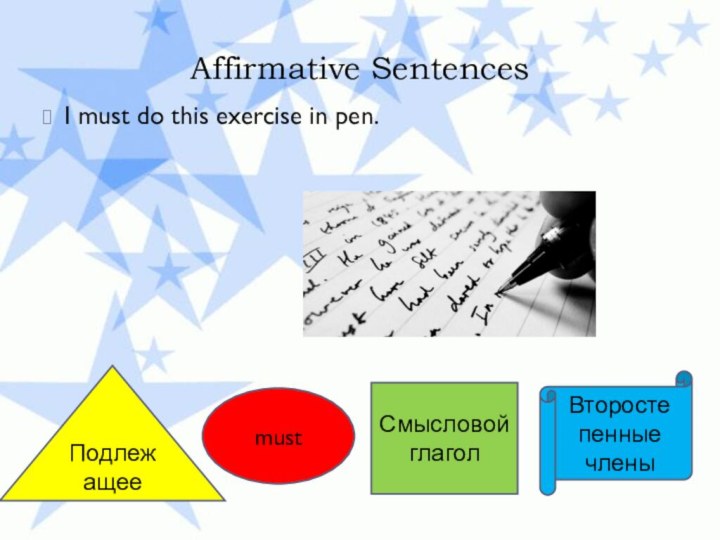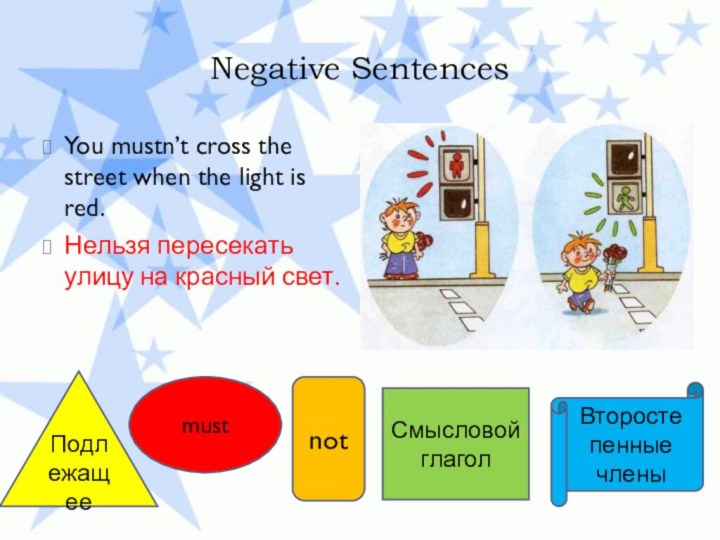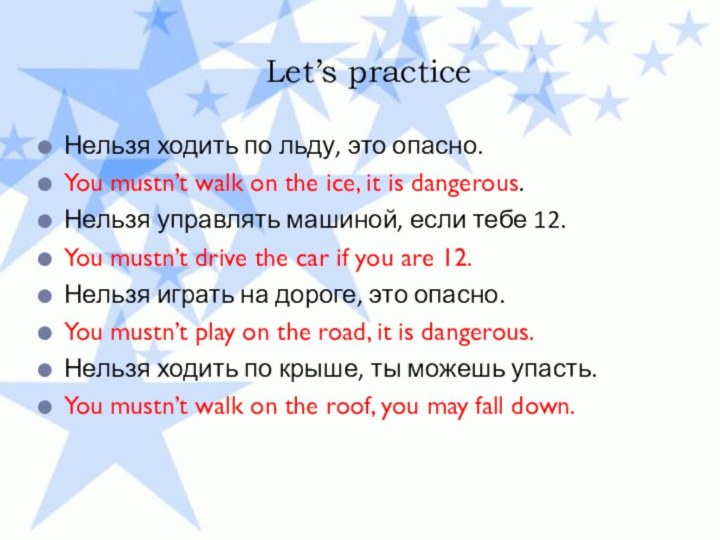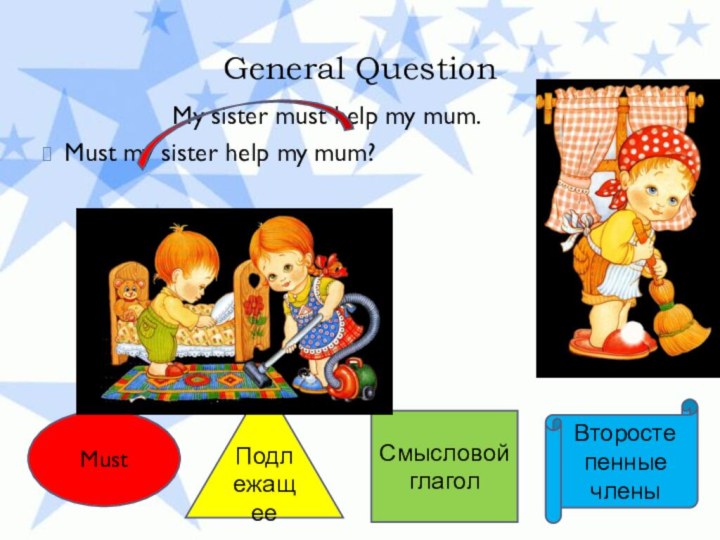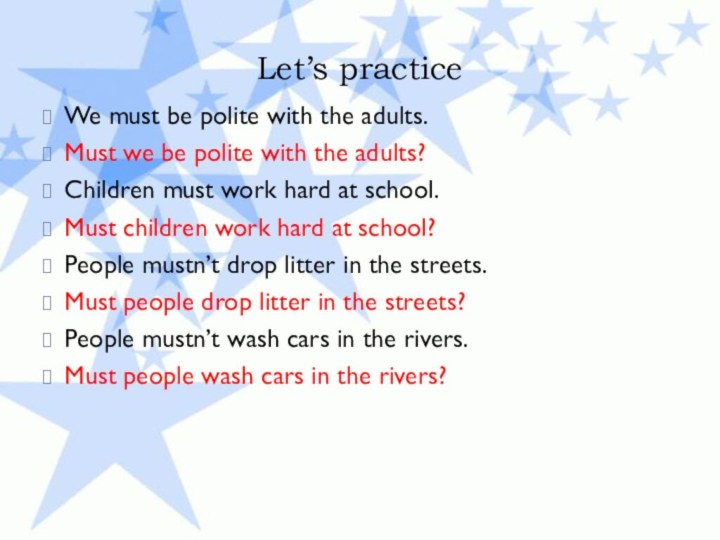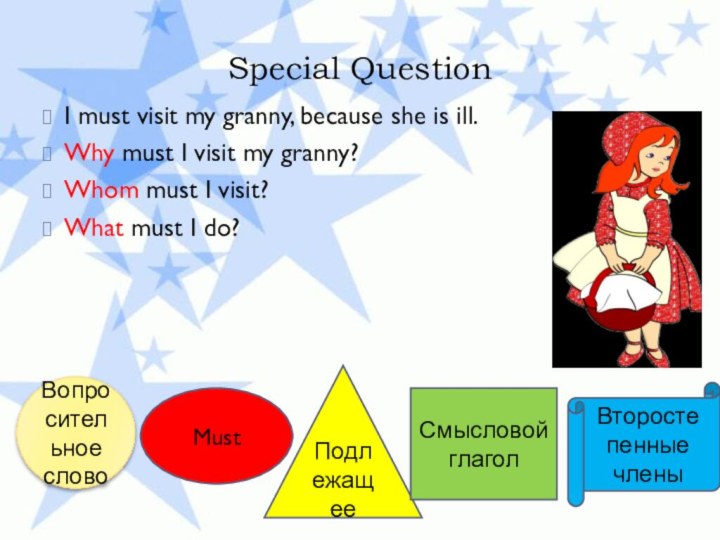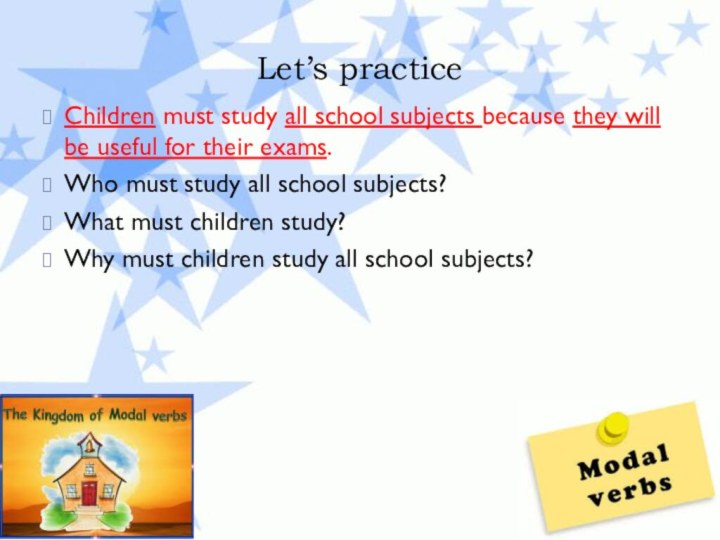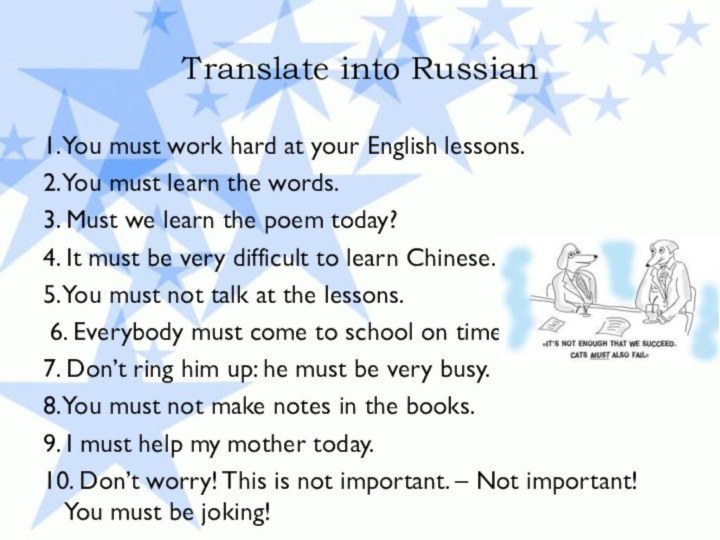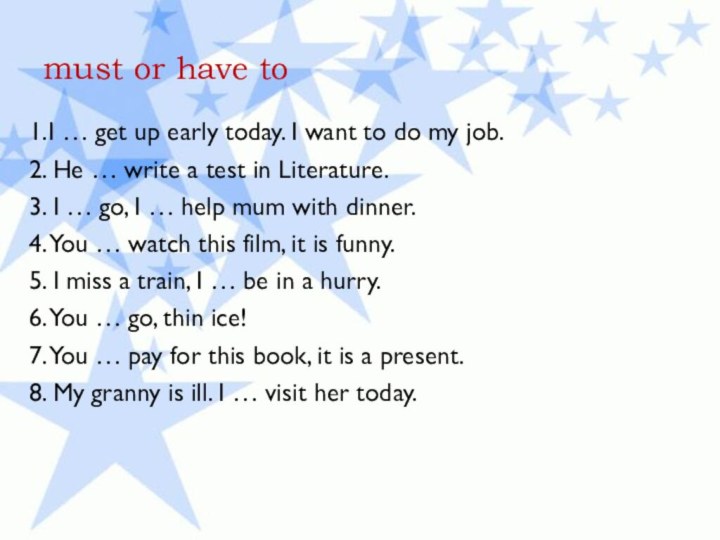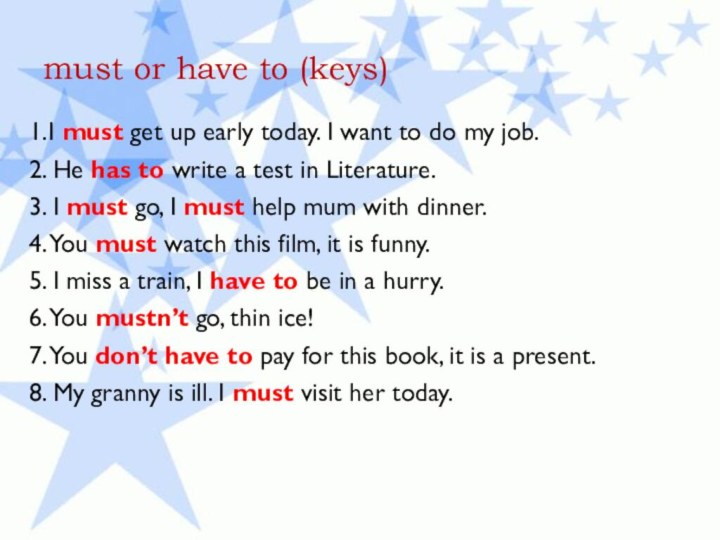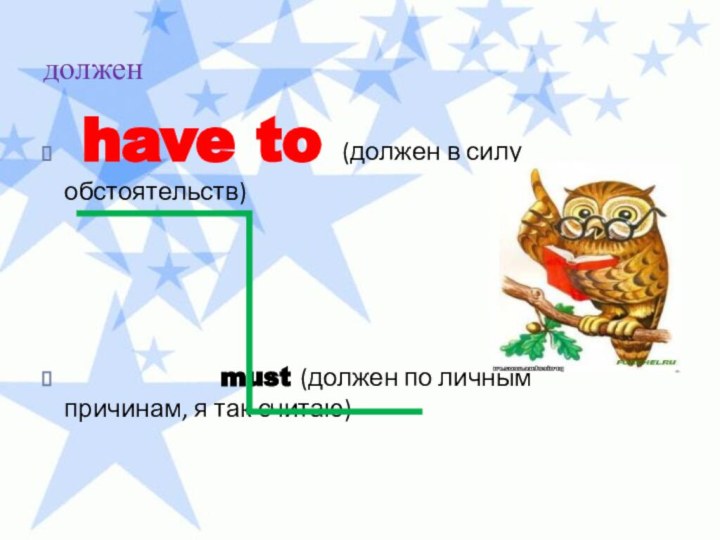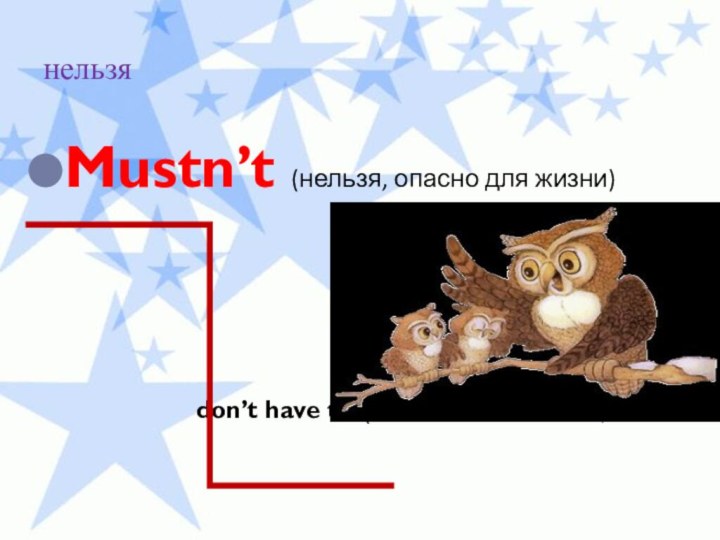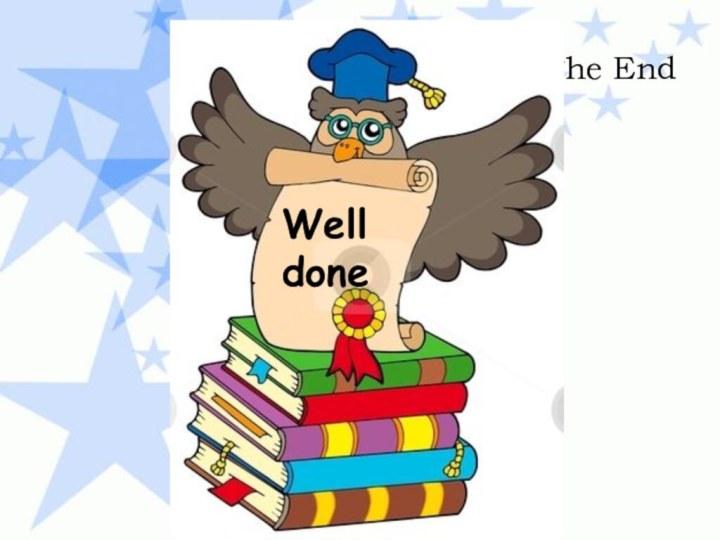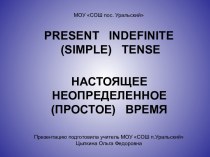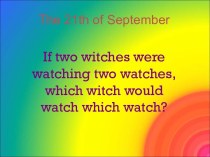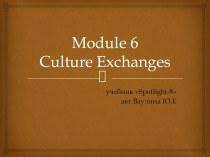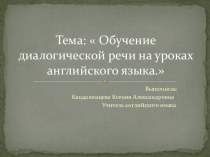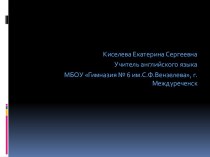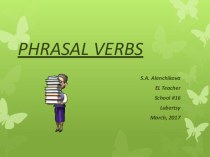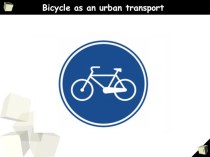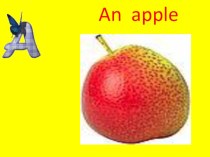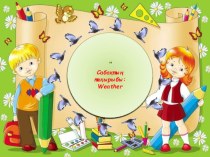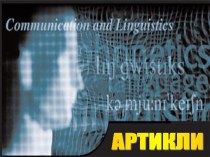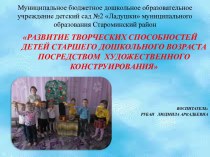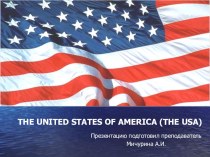Слайд 2
Model verb CAN and its equivalent: be able
to
Глагол can обозначает физическую или умственную способность совершить действие.
Глагол
can переводится словами «мочь», «уметь».
Глагол can имеет форму прошедшего времени(could) и заменитель be able to.
Слайд 3
Translate the following sentences:
My sister can play the
piano very well.
My brother could read when he was
4 years old.
Could you speak English 2 years ago?
Will you be able to speak English well in 2 years?
We can meet you after classes.
Слайд 4
Put the necessary form of the verb can
Last
year my little sister...not write, but she...write this year.
My
mother...cook very well.
I...not do this exercise yesterday, because I was busy.
I...swim well next year.
Слайд 5
Put the missing form of the verb can
Last
year my little sister could not write, but she
can write this year.
My mother can cook very well.
I could not do this exercise yesterday, because I was busy.
I will be able to swim well next year.
Слайд 6
Translate the sentences from Russian into English
Я не
умею кататься на коньках.
Ты сможешь пойти в кино завтра
вечером?
Мы не смогли перевести этот текст, потому что он трудный.
Мой друг умеет хорошо играть в теннис.
Я не смог открыть это окно.
Слайд 7
Learn
“Tick”, the clock says,
“Tick, tick, tick,
What you
have to do
Do quick”.
Слайд 8
Usage have to
необходимо что – то сделать
в силу определенных обстоятельств
I have to get up at
7 o’clock in the morning. (уроки начинаются в 8 часов)
He has to be in a hurry not to miss a train. (поезд уходит по расписанию)
Слайд 9
I have to
We have to
You have
to
They have to
He has to
She has to
It has to
Слайд 10
Interrogative sentences
We have to be in
the
theatre on time.
Мы должны быть в театре вовремя.
Модальный глагол
Подлежащее
Смысловой глагол
Второстепенные члены
Слайд 11
Let’s practice
1. I … to come
home at 5 o’clock.
2. My mother …
to clean the floor every day.
3. We … to learn English.
4. My friends … to write a test.
5. They … to speak French to their guests from France.
6. He … to buy ticket for the train.
have
have
have
have
has
has
Слайд 12
General Question
Do you have to go to school
tomorrow?
Does she have to go to school tomorrow?
Do/
does
Подлежащее
Модальный
глагол
Смысловой глагол
Второстепенные члены
Слайд 13
Let us practice
… you have
to buy a ticket?
… you
have to go to school tomorrow?
.. he have to answer this question?
… they have to put on warm coat in winter?
… she have to read history for tomorrow lesson?
Do
Do
Does
Will
Will
Слайд 14
Alternative question
Do you have to go to school
or hospital tomorrow?
Does he have to speak English or
French?
Do/ does
Подлежащее
Модальный глагол
Смысловой глагол
Второстепенные члены
or
or
or
Слайд 15
Let’s practice
My brother has to play football in
school team.
Мой брат или мой друг должен играть в
футбол за школьную команду?
Does my brother or my friend have to play football in school team?
Мой брат должен играть в футбол или баскетбол в школьной команде.
Does my brother have to play football or basketball in school team?
Слайд 16
Tag Questions
I have to do my homework, don’t
I?
She has to play the piano, doesn’t she?
Подлежащее
Модальный
глагол
Смысловой глагол
Второстепенные члены
,
do/ does
местоимение
not
Слайд 17
Special Question
I have to get up at 7
o’clock tomorrow.
When do I have to get up tomorrow?
Слайд 18
Question to the subject
I have to get up
at 7 o’clock tomorrow.
Who has to get up at
7 o’clock tomorrow?
who
has to
Смысловой глагол
Второстепенные члены
Слайд 19
Let’s practice
He doesn’t have to do his homework
today.
Who doesn’t have to do his homework today?
What doesn’t
he have to do today?
When does he have to do his homework?
Слайд 20
Usage must
Для выражения обязанности
Для того, чтобы дать
настойчивую рекомендацию
I must help my mother.
You must watch this
film. It’s interesting.
Слайд 21
Let’s practice
Ты должен прочитать эту книгу.
You must read
this book.
Мой брат должен погулять с собакой.
My brother must
walk the dog.
Нам нужно навестить больного друга.
We must visit our sick friend.
Мне нужно убрать в доме сегодня.
I must clean the house today.
Слайд 22
Affirmative Sentences
I must do this exercise in pen.
Подлежащее
must
Смысловой глагол
Второстепенные члены
Слайд 23
Negative Sentences
You mustn’t cross the street when the
light is red.
Нельзя пересекать улицу на красный свет.
Подлежащее
must
Смысловой
глагол
Второстепенные члены
not
Слайд 24
Let’s practice
Нельзя ходить по льду, это опасно.
You mustn’t
walk on the ice, it is dangerous.
Нельзя управлять машиной,
если тебе 12.
You mustn’t drive the car if you are 12.
Нельзя играть на дороге, это опасно.
You mustn’t play on the road, it is dangerous.
Нельзя ходить по крыше, ты можешь упасть.
You mustn’t walk on the roof, you may fall down.
Слайд 25
General Question
My sister must help my mum.
Must my
sister help my mum?
Must
Подлежащее
Смысловой глагол
Второстепенные члены
Слайд 26
Let’s practice
We must be polite with the adults.
Must
we be polite with the adults?
Children must work hard
at school.
Must children work hard at school?
People mustn’t drop litter in the streets.
Must people drop litter in the streets?
People mustn’t wash cars in the rivers.
Must people wash cars in the rivers?
Слайд 27
Special Question
I must visit my granny, because she
is ill.
Why must I visit my granny?
Whom must I
visit?
What must I do?
Must
Подлежащее
Вопросительное слово
Смысловой глагол
Второстепенные члены
Слайд 28
Let’s practice
Children must study all school subjects because
they will be useful for their exams.
Who must study
all school subjects?
What must children study?
Why must children study all school subjects?
Слайд 29
Translate into Russian
1. You must work hard at
your English lessons.
2. You must learn the words.
3. Must we learn the poem today?
4. It must be very difficult to learn Chinese.
5. You must not talk at the lessons.
6. Everybody must come to school on time.
7. Don’t ring him up: he must be very busy.
8. You must not make notes in the books.
9. I must help my mother today.
10. Don’t worry! This is not important. – Not important! You must be joking!
Слайд 30
must or have to
1.I … get up early
today. I want to do my job.
2. He …
write a test in Literature.
3. I … go, I … help mum with dinner.
4. You … watch this film, it is funny.
5. I miss a train, I … be in a hurry.
6. You … go, thin ice!
7. You … pay for this book, it is a present.
8. My granny is ill. I … visit her today.
Слайд 31
must or have to (keys)
1.I must get
up early today. I want to do my job.
2.
He has to write a test in Literature.
3. I must go, I must help mum with dinner.
4. You must watch this film, it is funny.
5. I miss a train, I have to be in a hurry.
6. You mustn’t go, thin ice!
7. You don’t have to pay for this book, it is a present.
8. My granny is ill. I must visit her today.
Слайд 32
должен
have to (должен в силу
обстоятельств)
must (должен по личным причинам, я так считаю)
Слайд 33
нельзя
Mustn’t (нельзя, опасно для жизни)
don’t have to (нет необходимости)
Слайд 34
Использованные ресурсы
http://im1-tub-ru.yandex.net/i?id=243112704-51-72&n=21
http://s44.radikal.ru/i106/1107/07/f3d980de4b7c.jpg
http://im1-tub-ru.yandex.net/i?id=144387464-10-72&n=21
http://www.andysowards.com/blog/assets/Practical-Tips-on-Building-a-Successful-Blog.jpeg
http://img1.liveinternet.ru/images/attach/b/3/20/886/20886987_44.jpg
http://im6-tub-ru.yandex.net/i?id=96074554-32-72&n=21
http://im2-tub-ru.yandex.net/i?id=655147518-66-72&n=21
http://img1.liveinternet.ru/images/attach/c/3/75/878/75878591_44252553_1243241607_multpictnarod.gif
